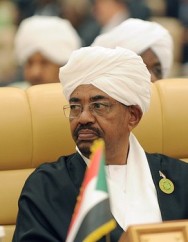Sudan’s Bashir confirms he will stand down by 2015
March 19, 2013 (KHARTOUM) – Sudanese president Omer Hassan al-Bashir has reiterated his intention to step down at the end of his term in 2015, saying Sudan is in need of “fresh blood”.

He said the new leader will be named at NCP’s general convention next year.
“Elections will be held in two years and this gives them sufficient time to choose their candidate, God willing,” he said.
“It is not about who will be the candidate, it is rather about how the NCP selects its coming leader,” he said, ruling out any possibility that the party would nominate him again for the top job.
“No, we [have] had enough. We spent more than 20 years [as president] and this is more than enough. Sudanese people are looking for fresh blood and a new impetus in order to continue on what we have begun,” he said, adding that the party was well-positioned to contest the next election.
Bashir did not address rumours about his health nor the hanging arrest warrant issued against him by the International Criminal Court (ICC).
The 68-year-old president underwent throat surgery last August in Qatar performed, which was only officially acknowledged weeks after.
He underwent a second operation in Saudi Arabia last November, with officials saying he was advised to cut down on his public appearances.
This month, he secretly flew to Saudi Arabia again for a medical checkup, according to a presidential source.
Bashir has been ruling Sudan since taking power in an Islamist-backed military coup in 1989.
In 2009 he became the first sitting head of state to be served with an arrest warrant from the ICC for war crimes and crimes against humanity allegedly committed in the Darfur conflict, which according to the UN, led to the death of 300,000 people and displacement of 2.7 million in 2003-2004.
He had previously made public his intention to step down at the end of his term in 2015, but last month second vice-president Al-Haj Adam Youssef said that Bashir would be renominated for a new term.
COUP PLOT TRIAL BEGINS
In the interview, Bashir was also quizzed about the status of investigations in to a recent coup attempt to overthrow the government and the possibility that those involved had external connections.
“Let me assure you that this group doesn’t have any connections to a third-party, they are purely Sudanese elements. Their trial has begun and the court held the first hearing and we will be waiting for the court’s ruling”, he said, without providing further details.
Sudanese authorities arrested 13 suspects last November, following the failed coup plot, including ex-spy chief Salah Gosh and Brigadier General Mohamed Ibrahim Abdel-Galil from the Sudanese Armed Forces (SAF) who also served as Bashir’s bodyguard at one point.
The trial of military personnel accused of involvement in the plot began on Thursday in Khartoum amid intense secrecy.
NORTH-SOUTH RELATIONS
Asked to comment on the prospects for future cooperation with the South, Bashir reiterated to Al Shraq that despite their often thorny relationship, South Sudan remained Sudan’s closest neighbour and vice versa, with existing ties and interests irrevocably linking the two.
Under an agreement inked in Addis Ababa on 12 March, South Sudan has agreed to resume oil production, ending a bitter deadlock over border and security issues that had threatened to send both countries back to war.
Landlocked South Sudan shut down its 350,000 barrel-per-day crude output in January last year over a dispute on how much it should pay to pump its oil through Sudanese pipelines to the Red Sea.
The closure had a devastating effect on the economies of both countries, which are heavily dependent on oil revenues, and worsened ongoing disagreements over territory and other issues left unresolved between the two countries following South Sudan’s secession in July 2011.
Bashir conceded that Sudan’s “enemies” continued to target it through South Sudan, adding that any positive developments in relations between the two countries was likely to lead to increased foreign meddling in their national affairs.
“However, we bet on our relationship with our brothers in South Sudan because they know well that their interests are connected to ours. We aren’t only talking about exporting the Southern oil, although it is the only source of income for our brothers in South Sudan as they don’t have any other tapped resources to substitute for it”, he said.
“We also refer to the old and continuing relations, be it demographic, cultural, economic, or trade relations because we were once one country for a hundred years”, he added.
Bashir dismissed alternative route options through Kenya and Ethiopia which had been flagged during the long-running stalemate, saying Sudan remained the only economically feasible option to pump South Sudan’s oil for export.
(ST)
